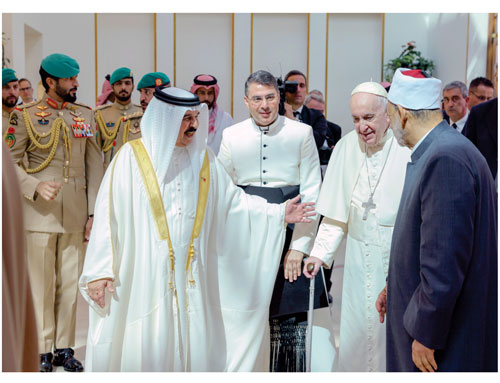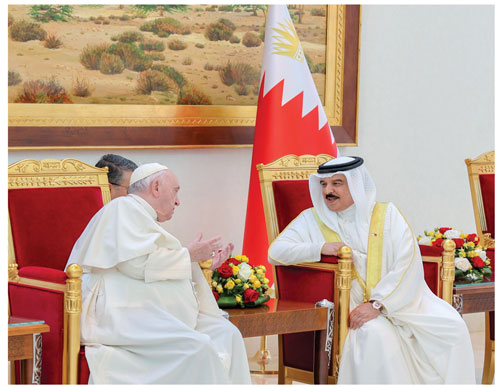During the turbulent times of confusion and uncertainty of the late 1990s, Hamad bin Isa Al Khalifa had an exceptionally clear and burning sense of Bahrain’s destiny in the modern world.
HM the King sought to establish a general framework for effective governance of a more modern and advanced nation destined to grow and change, where no one is left out or behind and all people can contribute in their capacities to the national building process.
It all started officially on October 3, 2000, when, opening the new session of the Shura Council, he identified in his address to the nation key features to start a new stage in Bahrain’s political future.

On November 23, he issued Decree 36 forming a national committee to draft the National Action Charter, a covenant document and a pillar of a new political, social and economic structure in Bahrain.
The committee made up of 44 of the finest men and women of Bahrain, representing the various segments and components of the country, drew on the knowledge, expertise and experience of its members and drafted the Charter that set out the main principles, foundations and objectives of the reform process and the new political, social and economic structure.
The Charter dealt with the basic introductions of Bahraini society, the objectives and foundations of governance, fundamental rights and freedoms of the citizens of Bahrain; the foundations upon which the family, community and civil society organizations are based, education, culture, science and work as a right and an obligation.
For days, these fine people worked together amid great debates, driven by a strong sense of patriotism and guided by a deep commitment to the nation.
The Charter was a Bahraini idea, drafted by Bahrainis and supported by Bahrainis. The move for far-reaching reforms was from within and was not imposed on the country. It had all the ingredients of success.

After kneading it into its final form, the Charter was put to the people who freely, as stated by all national and international institutions, supported it overwhelmingly, on February 14, 2001, with 98.4 percent of the voters approving it.
It was a resounding victory for introducing great changes. It was applauded instantly and warmly by all peace-loving countries and international institutions.
Today, 21 years later, Bahrain proudly celebrates the democratic achievements, human rights freedoms and integrated development that have emanated from the National Action Charter.
The Charter launched a new era of political and democratic reform within a modern constitutional monarchy, the rule of law based on justice and transparency, the separation of legislative, executive and judicial powers and their cooperation in accordance with the Constitution.
The Charter and the ensuing Constitution also resulted in guaranteeing public and personal freedoms and equal rights and duties, freedom of political, social, educational, cultural, professional associations and trade unions, the consolidation of economic freedom, the diversification of the sources of income, and the protection of the environment and wildlife.
Quadrennial parliamentary and municipal elections have been held regularly since 2002 in full integrity and transparency under judicial supervision and with a high turnout.
The successful presence of Bahraini women in all democracy entitlements, including members of parliament and municipal councils and winning the Speakership of the parliament in the fifth term, is a tribute to women’s political empowerment.
The elevation of the status of women as full and dependable partners, championed by the Supreme Council for Women under the leadership of its Chairwoman HRH Princess Sabeeka bint Ibrahim Al Khalifa, Wife of HM King Hamad, has motivated their successful participation in the decision-making process.
Under the Charter, Bahrain has achieved a qualitative leap in the respect of human rights and freedoms, equality and equal opportunities for all citizens without any discrimination on grounds of sex, religion, origin or belief.
There is also pride in the Charter ensuring the freedom of the press, media and expression without allowing incitement to religious or sectarian hatred, violence, fanaticism or terrorism.
The Charter has also allowed Bahrain, under the leadership of HM King Hamad bin Isa Al Khalifa and his wise policy both locally and internationally, to strengthen its pioneering stature as a model of good governance, comprehensive and sustainable development, supporting the efforts of the international community in maintaining peace, stability and security, combating extremism, fanaticism and terrorism.
The Charter, at its core, has consolidated freedom of faith, religious tolerance, mutual acceptance and peaceful-co-existence. Non-Muslims have had political representation in addition to other high-profile presences.
The Kingdom has faced tough challenges, but it was fortunate to have the leadership who confidently met the times, transformed them into opportunities and problems into solutions and consolidated the perspective of Bahrain’s image as a country that invariably looks forward to tomorrow.
Thus, Bahrainis, young and old, continue to look at the Charter plebiscite with profound gratification, great patriotism and full allegiance to their leaders. It has given them confidence and hope.
Their Kingdom has been making great strides ahead, filled with anticipations and ambitions. They look forward to continuing the great reform process and to building on it, well aware that their unity – unique and impressive – and their sense of responsibility, based on full inclusiveness, have made them stronger and more determined.
They confidently face challenges and assertively confront intrigues and plots, powered by the judicious leadership of their king and motivated by success that has become the hallmark of the nation.
They remain committed to the objectives and noble principles embodied in the Charter: respect for others and non-interference in their affairs, peace, security, amicable relations and international cooperation among nations and peoples. The anniversary of the National Action Charter is for them another auspicious occasion to reaffirm their unwavering patriotism and love for their nation and their proud loyalty to their king.










